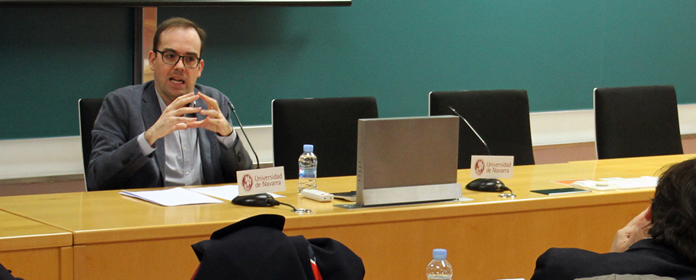Religious freedom throughout history, the topic of a workshop of the Institute for Culture and Society
The session is part of a research of project 'Religion and Civil Society' and is funded by the Ministry of Economics and Competitiveness.

PHOTO: Manuel Castells
Religious freedom and Church-State separation as we know them today have been possible thanks to the narratives constructed throughout the nineteenth and twentieth centuries. As Rafael García researcher of project 'Religion and Civil Society' of the Institute for Culture and Society of the University of Navarra. The expert has organized the workshop 'Religious freedom and Church-State relations in the nineteenth and twentieth centuries', where these narratives have been analyzed.
According to the organizer, these stories managed to mediate between the two narratives existing in these centuries: the liberal one, "which affirmed the incompatibility between Catholicism and religious freedom"; and the "Catholic confessional counter-narrative that saw religious freedom as a threat to religion," he explains.
As he states, a 'third way' emerged among liberal Christian authors, such as Tocqueville, who "made a different interpretation of the dominant liberal narrative to highlight the compatibility between Catholicism and religious freedom".
During the workshop, the discourses in defense of religious freedom in different parts of Europe and America, such as Spain, France, the United States and Mexico, in the 19th and 20th centuries were analyzed. "In countries such as Mexico, Catholics defended religious freedom in the face of governments that denied it," García explains.
Some of the workshop presentations were"Religious freedom in Mexico: conflicts in the narrative", by Carmen Alejos; "Christian civilization and the Muslim world in Tocqueville", offered by the organizer; or"Conflict of Catholic narratives on religious freedom: Spain and the United States", by Rafael Escobedo.
Religion. History and actualityAt present, there is an enormous variety of institutional solutions in Europe," says the researcher, "but in all countries religious freedom is recognized as a right that must be guaranteed. Thus, despite the separation of Church and State, there are states considered confessional "compatible with a regime of religious tolerance", as is the example of England.
The separation of politics and religion has not minimized the impact of different religions in Western society, and Europe continues to draw from its Christian roots. This is reflected in the public celebration of religious holidays, the study of religion in public schools and the impact of Church-dependent associations "such as Caritas" on society, says García.
This research is developed in the subproject 'Narratives in conflict: religious freedom and Church-State relations in the nineteenth and twentieth centuries', framed in the project 'Religion and Civil Society' and is funded by the Ministry of Economics and Competitiveness of the Government of Spain (Ref. DER2016-76619-P).
